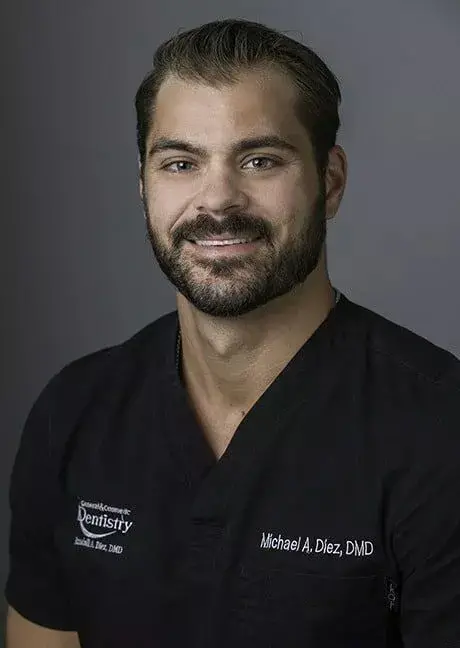Dental implants are artificial tooth roots made of biocompatible materials such as titanium that are surgically placed into the jawbone to support replacement teeth, such as crowns, bridges, or dentures. They provide a strong and stable foundation for prosthetic teeth, mimicking the function and appearance of natural teeth. Dental implants offer numerous benefits, including improved chewing and speaking ability, enhanced aesthetics, preservation of jawbone structure, and long-term durability. Unlike traditional dentures or bridges, dental implants prevent bone loss in the jaw and do not rely on adjacent teeth for support, thus promoting oral health and longevity. With proper care, dental implants can last a lifetime, restoring confidence in one's smile and quality of life.
Types of Dental Implants
Endosteal Implants
Endosteal implants are the most common type of dental implants in South Tampa, FL, and are surgically placed directly into the jawbone. They consist of screws, cylinders, or blades that anchor the prosthetic teeth securely. Endosteal implants are suitable for patients with adequate bone density and offer excellent stability and support for single crowns, bridges, or dentures.
Subperiosteal Implants
Subperiosteal implants are positioned on the jawbone but beneath the gum tissue. Unlike endosteal implants, which penetrate the bone, subperiosteal implants rest on a metal framework placed on the bone's surface. This type of implant is ideal for patients with insufficient bone height or density and provides a viable alternative to traditional implant placement techniques. Contact us today!
Who is a Candidate for Dental Implants?
- Good general health is essential for successful dental implant surgery. Patients should be in good overall health and free from uncontrolled systemic conditions such as diabetes, cardiovascular disease, or autoimmune disorders. These health conditions can increase the risk of complications during surgery and affect healing after implant placement.
- Adequate oral health is crucial for dental implant success. Candidates should have healthy gums and sufficient bone density to support the implant. If significant bone loss or periodontal disease is present, additional treatments such as bone grafting or periodontal therapy may be necessary before implant placement.
- Sufficient bone volume and density are necessary to support dental implants. During the consultation, the dentist in Tampa, FL, will evaluate the quality and quantity of the jawbone using imaging techniques such as X-rays or CT scans. If insufficient bone is present, bone grafting procedures may be recommended to augment the bone volume before implant placement.
- Smoking and tobacco use can significantly compromise the success of dental implants by inhibiting healing and increasing the risk of implant failure. Candidates are advised to quit smoking or using tobacco products before undergoing implant surgery to optimize the chances of successful outcomes.
- Maintaining proper oral hygiene is crucial for the long-term success of dental implants. Candidates should practice good oral hygiene habits, including brushing, flossing, and attending regular dental check-ups and cleanings after implant placement.
The Dental Implant Procedure
The process begins with an initial consultation with our dentist at General and Cosmetic Dentistry of Tampa. During this appointment, the dentist will evaluate the patient's oral health, including the condition of the teeth, gums, and jawbones. X-rays or CT scans may be taken to assess bone density and determine the feasibility of dental implant placement. The dentist will also discuss the patient's medical history, treatment goals, and any concerns or questions they may have. Based on the evaluation and diagnostic imaging, the dentist will develop a personalized treatment plan tailored to the patient's specific needs and objectives. This plan will outline the number of implants needed, the implant restoration type, and the treatment timeline.
The next step is placing the dental implants into the jawbone. This procedure is typically performed under local anesthesia to ensure patient comfort. The dentist will incision the gum tissue to access the underlying bone and then carefully drill small holes to insert the implants. Once the implants are securely in place, the gums are sutured closed, and a temporary restoration may be placed over the implants to protect them during the healing process.
After implant placement, osseointegration occurs, during which the implants fuse with the surrounding bone tissue. This integration process typically takes several months, during which patients may wear temporary restorations or remain without teeth in the treated area.
Once osseointegration is complete, a second minor surgical procedure may be necessary to place abutments onto the implants. Abutments are small connectors that protrude through the gums and serve as attachment points for the final implant restorations. After the gums have healed and the abutments are in place, the final implant restorations are fabricated and attached to the abutments. The dentist will ensure proper fit, function, and aesthetics before securely attaching the restorations to the implants.
Following the placement of the final restorations, patients will receive instructions for post-operative care and recovery. This may include guidelines for oral hygiene, dietary restrictions, and pain management. Patients should follow these instructions carefully to promote healing and ensure the long-term success of their dental implants.
The dental implant procedure offers a permanent solution for tooth replacement, restoring both function and aesthetics to the smile. Visit General and Cosmetic Dentistry of Tampa at 5010 Gunn Hwy, Tampa, FL 33624, or 3112 West Kennedy Blvd Suite A, South Tampa, FL 33609, to discover how dental implants can transform your smile and improve your quality of life. You can schedule an appointment online or call us at (813) 960-5869 or (813) 874-5869.


